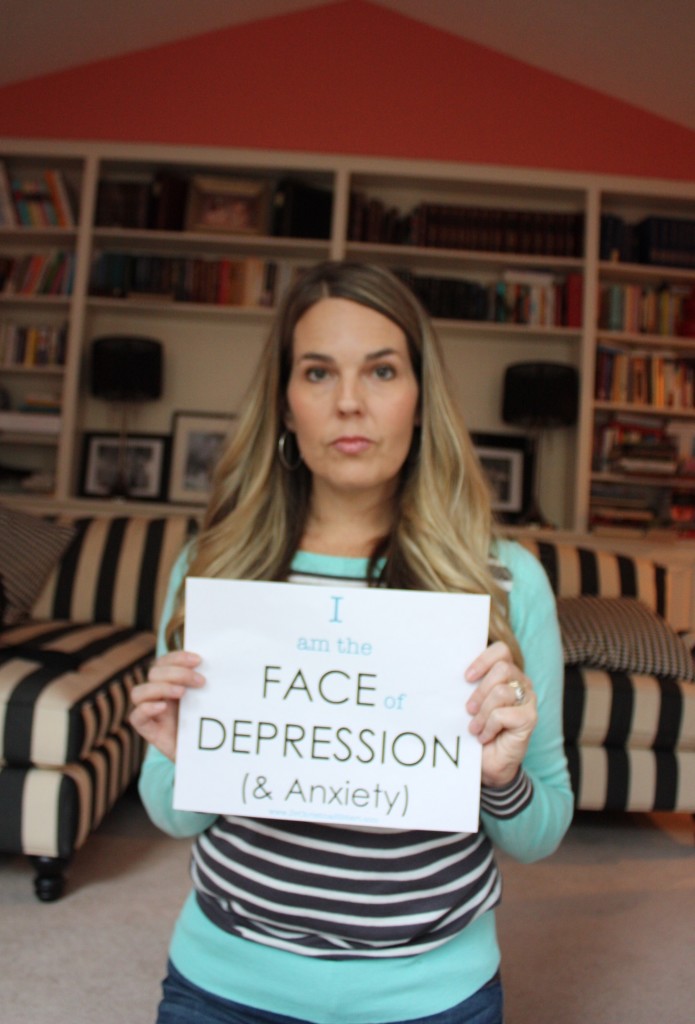
04 Dec Overcoming the Stigma of Depression & Anxiety: “I am the FACE of DEPRESSION”
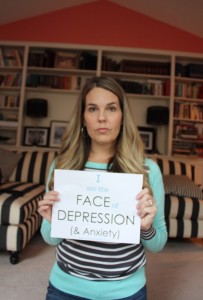 I am the face of depression and anxiety. It has taken me a while to come to grips with this fact. I don’t want to be someone who struggles with depression. I’ve worked hard throughout my life to understand mental illness and to apply the tools I’ve learned professionally to my personal life so I could prevent depression and anxiety. I have a strong family history of mental illness, especially depression, and this drove me early on. I did not want to suffer like my family members had.
I am the face of depression and anxiety. It has taken me a while to come to grips with this fact. I don’t want to be someone who struggles with depression. I’ve worked hard throughout my life to understand mental illness and to apply the tools I’ve learned professionally to my personal life so I could prevent depression and anxiety. I have a strong family history of mental illness, especially depression, and this drove me early on. I did not want to suffer like my family members had.
But fighting doesn’t necessarily stop clinical depression. I had postpartum depression/anxiety after all four of my childbirth experiences, try as I did to prevent it. I’ve been through trauma, and more times of grief than I can count, all of which included significant feelings of depression. And yes, I’ve experienced episodes of Major Depression.
The first was when I was 18, a couple of months after my 8 year-old sister died, just when I thought I’d gotten through the worst of my grief. That was the first time I went to therapy, and it was life changing. It encouraged me to become a psychologist so I could help others like me.
The second came smack dab in the middle of graduate school. I knew life was busy, but I was floored when I suddenly found myself struggling to get up and take care of my school, work, children, husband, and self. After weeks of fighting it, I realized I needed to stop saying, “I don’t want to be depressed.” I was depressed. Sometimes, the problem is the fighting. This was a great lesson in learning to “accept what is.”
My third episode hit about six years ago, nearly one year after my sister and brother-in-law had died and my world had been turned upside down as I had suddenly become a mother of six. I’d already been in therapy for over a year, but with the addition of a court battle, adopting our new sons, and the deaths of two more family members, I found myself lower than ever.
As I wrote in my memoir, of that time: “It’s official. I’m depressed…That’s what Dr. Hale said on Monday, ‘Helplessness and hopelessness? Sounds like depression.’…Why is this such a shock?…I feel unmotivated, lost, pessimistic, and this makes me feel like I’ve failed. I thought I’d be better by now…I thought I was stronger… Now I’m starting to see an antidepressant as a possibility. I can’t continue feeling so low when I need to be at my best. I can’t afford to keep saying, ‘I’ll feel happy when….’ Could a little pill be the missing piece I need to help me grow?” (This is How We Grow, p. 216-17). It was. My first time taking an antidepressant, I took it for the next six months. It helped tremendously.
Watch my “I am the FACE of DEPRESSION” YouTube video, and then add your voice to mine…
[stream provider=youtube flv=http%3A//www.youtube.com/watch%3Fv%3DbMNPUsCHA2M img=x:/img.youtube.com/vi/bMNPUsCHA2M/0.jpg embed=false share=false width=640 height=360 dock=true controlbar=over bandwidth=high autostart=false responsive=16:9 /]
Fast forward to seven weeks ago. I had been working hard to stop being so busy, because I wanted to take care of myself. My dear friend had died as a result of depression and suicide six months before, and I had once again worked through intense grief. I took from her death the great importance of prioritizing my health—for my children, for my husband, and for myself. I was working on slowing down, doing less, and focusing on wellness.
That’s why it caught me so off-guard. At first, I thought it was “hormones.” Then, insomnia crept in. I’m normally not a great sleeper, but this insomnia was getting out of control. My thoughts were racing, and I couldn’t settle down. I thought, perhaps, the lack of sleep was causing my mood symptoms, but three weeks later, I had to wonder if it wasn’t the other way around.
“Am I depressed?” I began to wonder, but pushed the thought aside. Again, “I don’t want to be depressed” kept flooding my mind. I stopped every extra activity, stayed in, carved out alone time, and tried to nap and sleep as much as possible. I tried talking with a close friend, letting my husband help me, and writing. I tried to exercise more and take more Omega-3’s.
But I was getting worse. My anxiety was getting out of control, making me sick to my stomach for weeks, and making me so frustrated I was horrible to be around. I was starting to feel incredibly down on myself, and worse than that: hopeless. Finally, I made an appointment with my doctor. Many tests later she confirmed what I had already guessed: “You’re perfectly healthy. You have a slight hormone imbalance, but that probably isn’t causing your mood symptoms.” I knew she was right. Enter Major Depression episode number four.
Watch this 3-Minute therapy video on Anxiety: The #1 Mental Health Issue in Women
[stream provider=youtube flv=http%3A//www.youtube.com/watch%3Fv%3DKbk709-fjDM img=x:/img.youtube.com/vi/Kbk709-fjDM/0.jpg embed=false share=false width=640 height=360 dock=true controlbar=over bandwidth=high autostart=false responsive=16:9 /]
Why am I sharing this now?
Maybe it’s the fact that my friend lost her life last April, as a result of depression she felt she had to hide. Maybe it’s the fact that I’m still fired up about the court hearing I attended a couple months ago where this dear woman is serving 40 years

40th birthday selfie. I don’t look depressed, do I? I gave it my all, & made a great day! But, “You can’t always tell by looking.”
after suffering from postpartum psychosis, about the injustice of how mental health is perceived and treated in this country. Maybe it’s the fact that as I go through depression and anxiety once again, I am once again faced with the way people don’t want to know about it, how it feels like I have to hide it, how I would be better off if I had a physical illness because at least people would see that it’s real. Perhaps it’s that I just celebrated my 40th birthday, and I feel like I don’t want to hold anything back anymore.
Whatever it is, I can no longer sit by and let those struggling with depression be forced into the shadows, be treated like lepers or, worse, be completely ignored. I want to, no I need to, help give depression a face and a voice. I need others to acknowledge it as real, to seek to understand it, to see that those who suffer from depression are excellent, wonderful, successful people! To see that we all have mental and physical vulnerabilities, and depression just happens to be one of them, and that’s okay.
It’s okay to suffer from depression. We can admit it. We can say it. It doesn’t make us any less. And guess what? You can’t always tell by looking. So ask.
The Many Faces of Depression
Ask, “Can you tell me about your depression?” Because, the more we talk about it—the more those who struggle say it out loud—the more we can understand the many faces of depression. Though its symptoms may generally be the same, depression can look, and feel, very differently for different people. Understanding this will help us break down the stigmas that make those who suffer from depression feel like they have to hide.
For me, depression means anxiety. I can’t say which comes first, but I do know that the anxiety makes me feel far more depressed. My thoughts spin out of control. I try to get them back in check, using a thought record, journaling, talking about them, but they seem to be controlling me instead of the other way around, bringing me down and zapping my energy.
I also have symptoms like:
- Insomnia
- Extreme stress (every little thing can seem like too much)
- Feeling overwhelmed and frustrated (frustrated I can’t fix this, frustrated that others can’t seem to help me, frustrated with feeling so alone, but mostly, frustrated about being depressed again.)
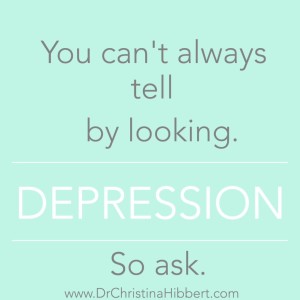
- Low energy, fatigue, exhaustion
- Sadness and crying
- Anger (Crying, then getting angry because of how I feel, then feeling sad again and crying some more. I can’t understand my emotions and I definitely can’t seem to control them.)
- Feeling restless (I have a hard time focusing on things I usually enjoy, like a good book. I feel like I need to get up and do something.)
- Changes in appetite (some days I’m overdoing it with junk food; others, I have no appetite)
- Gastrointestinal symptoms, muscle tension, and headaches. (The stress and anxiety literally make me sick.)
- Feeling alone (like I don’t’ know who to turn to. I have helped so many people through depression, but where do I turn when I need help? I struggle with this, feeling like no one would get it. Everyone thinks “I’m fine,” and they keep asking me for help, but I’m not. And no one understands. I’m working on this, though, because my rational brain knows I’m really not alone at all.)
- Feelings of resentment (I admit, I have been resenting everyone who needs me. “I need myself!” I keep saying. I’m learning to say “no” and take care of me.)
- Negativity (It’s a core component of depression–negative view of self, the world, and the future. But eventually, I can’t stand hearing myself think.)
- Desire to escape (Watching TV and movies, driving somewhere, anything to get me out of my head and current situation.)
- Self-critical thinking (Thoughts like, “My body betrayed me.” “Why can’t I just be well? I’m weak.” “I’m a hypocrite, helping others while I can’t help myself.” “Why do I have to struggle with depression while others do not?” These thoughts plague me until I finally have to let them go and accept what is.)
- Hopelessness and helplessness (“I’m broken.” “Someone needs to fix me.” When I reach this point, I know it’s Depression. The healthy me is a big believer in hope and taking action.)
For me, Treatment for Depression includes things like:
- Psychotherapy. I’ve been through many rounds of therapy in my life, and each time it has helped me in some new and important way. I learn new skills, process deep and painful emotions, uncover faulty beliefs, and it really helps to have an impartial and knowledgable supporter who can listen and help me see things I can’t see on my own.
- Antidepressants. Sometimes, I need them. I’m finally accepting that. This time and the last, I opted for an antidepressant, because I’d been struggling too long to be well and I can’t afford to wait months or years to feel better. I know, this is a tough decision for many, and it always is for me. I encourage you to read my article, “Antidepressant? Or Not?: 12 Facts on Depression & Medication” to help you in your decision.
- Exercise. Always a first line defense against depression. I’m even writing my next book about it.
- Sleep. I’m letting myself sleep in when I can, nap, and do whatever it takes to get my body back to healthy. A little Melatonin helps, too, when I can’t fall asleep at night.
- Reducing stress. I’m taking this one seriously this time. Doctors orders.
- Supplements & vitamins. Omega-3 Fish Oil, Vitamins B, E, and D, Calcium, Multivitamin, and Magnesium.
- Reevaluating and strengthening my support system. I’m learning who I can rely on and letting them help me.
- Identifying and changing faulty beliefs. I’m working on this one. Again. A deeper level of self-understanding and awareness, I know this is going to make a huge difference in my life.
- Alone time. To process, ponder, and make myself face what’s going on. This is how I receive understanding.
- Time with people I love. Connection gets me out of myself and reminds me how loved I really am.
- Powerful prayer and scripture study. Increasing my faith, relying upon God, seeking instruction and revelation for my health and happiness. This is probably the most important thing of all for me.
Break down the Stigma: Face Depression, Give it a Voice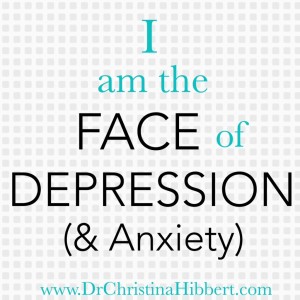
Mine isn’t the only experience of depression. Depression is the most common cause of disease in the world. And yet we keep silent about it. We force those who suffer to keep silent, because we can’t seem to break down the stigma of depression.
Well, not anymore, at least not for me. I can speak up now, because I’m working through my depression. I’m feeling much better these past few days, but I know I still have a lot of work ahead of me. And I will continue to speak out as a voice for depression and anxiety for as long as it takes. I will use my voice to help others learn to use theirs.
Join me in breaking down the stigma of depression by:
1) Speaking up when we are suffering from depression, giving it a voice and a face.
2) Facing depression when someone you know and love is struggling. Being there for them. Offering support and help.
3) Asking those you know and love to “Tell me about your depression.”
4) Simply joining the discussion, listening, learning, and seeking to understand.
5) Joining my “Many Faces of Depression” movement by sharing your personal story and photo here on my site. (More information on this to come soon, so subscribe (below), and stay tuned!)
We must speak up. We must show our faces, face depression, and give it a voice, even when we are struggling with depression. Especially when we are struggling, we must show the truth. It is the only way to stop the stigma and help the world, and each of us, heal and be whole again.
Do you or someone you love suffer from Depression or Anxiety? What is it like, and what helps? Leave a comment, below, and join your voice with mine.
Join “The Many Faces of Depression” movement!
Submit you story and/or photo, download “I am the FACE of DEPRESSION” printables, and be featured on my website in 2015!
Click here for information, rules and guidelines, and thank you for joining your voice with mine!
You may manage your subscription options from your profile.
Be sure to check out Dr. Hibbert’s Amazon Bestseller, This is How We Grow–
available now on Amazon.com!
Don’t miss a thing!
SUBSCRIBE, just below, “like” my Facebook pages (Dr. Christina Hibbert; This Is How We Grow), and follow me on Twitter,Pinterest, & Instagram!
You may manage your subscription options from your profile
Related Posts/Articles:
10 Benefits of Practicing Gratitude
Living a Life of Purpose & Meaning: The Key to true Happiness
Create the Life You Desire: Part 2–The 3 Steps of Creating
“This is How We Grow:” Understanding the Seasons of Personal Growth
Join my Free, Online “This Is How We Grow” Personal Growth Group!
Personal Growth & Family Vacation?: 10 Things I Learned in an RV with my Family of 8 for 8 Days
PPD & Motherhood Mental Health: Self-Care & Letting Help In–The 2 Most Important Things
10 Ways I Choose to Grow Each Day
Personal Growth & Self-Actualization: What Will Your Choice Be?
“These are my Strengths!” and “This is my Lame-O List!”: How to Embrace Strengths & Weaknesses
Parenting Success: It’s More about the Parent than the Child
Learning Self-Love: 5 Tricks for Treating Yourself More Kindly


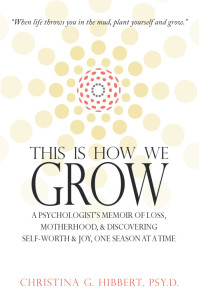
I wish I had a way with words like you so I could write what my depression/anxiety looks like…sigh…instead I’ll just say it looks like bags under my red swollen eyes, weight loss, knots that “crunch” in my neck and shoulders, visits to my AWESOME dentist for new crowns because I clench my teeth and crack them, and wanting to stay work despite not REALLY wanting to stay at work only because “life” doesn’t seem to be at work! xoxo I think you’re amazing and brave!
I think you have exactly the right words, Becky. I also clinch at night, and several years ago almost got a crown when i didn’t need one, because I was causing myself so much tooth pain! And I can definitely understand what you mean about working. It can be an escape in a way, and it can also be a burden. And, yes, your dentist IS awesome. Hugs to you, my dear friend! I think you’re amazing and brave, too! xo
This is a column I wrote about my experience with PPD.,,,http://m.buffalobulletin.com/mobile/opinion/columns/article_fd143df2-d37e-11e2-82f9-0019bb30f31a.html
Thank you for sharing this, Jen. I certainly know how hard it is to struggle with PPD, and how strong the stigma is about it. When we speak up about it, as you have done in your article, we help others speak up, too, get help, and heal. And for anyone else struggle through postpartum depression, “You’re not alone!” Please check out my articles/posts on the baby blues, postpartum depression, anxiety, psychosis, and treatment, above, under the “education” tab. xo
Thank you for speaking up about your own depression and symptoms. As I have expressed to you before, stigma is everywhere, even in the mental health industry with peers, workers, and professionals. I must insist that that is why you are liked so well by all your followers. Even without saying that you had hard times dealing with it we could all sense that you understood and that you get our messages and can empathize with us. It’s what makes you good at what you do. It may be hard to look at it as a gift from god, but that is what makes you the best person for the job and in the right industry!
I will write my insights into my depression that has plagued me for my whole life, under a fresh cover, as it may take a bit!
God Bless, Namaste
Avril
Dear Avril, your words are always so encouraging, and I thank you for that. I definitely agree with you on many counts. For one, mental health stigma is just as strong among mental health providers as anywhere, I think. Providers feel they can’t struggle because it would be unprofessional or make them seem poor at their job. But, I also agree with you that the things we overcome can make us particularly good at what we do. And I also agree that this is a gift from God. I always seek the “lesson” in my experiences, and I’m seeing so many positives in this that it’s hard not to be grateful for even my low times. I have to agree with you, I believe it IS why people want to read this blog or come to therapy with me or participate in my Personal Growth Group. I’m a real person, just like everyone else. I look forward to learning more about your experiences, and thank you again. Big hugs to you! xoxo
And for anyone else reading this wanting to join our This is How We Grow Personal Growth Group, here’s the link: http://www.drchristinahibbert.com/meaning-purpose-fulfilling-your-lifes-calling-this-is-how-we-grow-personal-growth-group-season-2/
Reading your article was like reading the ticker tape in my own head. It was a relief to read some parts and have the ‘yes I do/feel/think that’ moment that depressives are somehow always surprised by . In spite of all evidence to the contrary it seems that I am convinced most of the time that I am the only one in this mess and that others I know who are suffering from depression are doing it with better grace and still managing to achieve more than I do . A long time ago I decided that depression itself does kill people but that really it is the straw of keeping the extent of it hidden even from closest family that breaks the camel’s back for most and leads them to end their own lives. It is so isolating . I feel like I am behind a plate glass window, one step removed from my life . I can see my life but I can’t feel it no matter how much I want to. I manage to fully feel all the negative stuff though and all the anxiety. Depression runs in mu family too , well as the old joke goes it doesn’t run it strolls through and gets to know everyone personally ! I didn’t want to suffer like my mom did and my sister did and since my affair with depression did not really start til my mid 30’s I believed that I had taken all the right steps to ward it off . In medieval times they had amulets to ward off evil spirits in our era the amulet is positive mental attitude . Well my PMA was useless when depression hit after my son was hit by a car and I almost lost him . It was useless when family tragedy almost tore my family apart so I am willing to state for the record that PMA is snake oil . I would rather be physically ill too, just because if I could not walk nobody would try and convince me that I could really if I simply tried harder ! You didn’t mention anger much and I tend to deal with it with humour ( although admittedly edgy humoir) when my instinct is to verbally crush stupidity and/or callousness about depression and mental illness in general . I have to content myself with mocking them back into the stoneage where they will feel at home . I have entirely lost my thread now …..its late……but you get the picture . Thanks for doing this maybe I will come clean about my depression as a result , most folk know I have it but have no idea how much it shrinks my life .
I can relate to that thought that “I am the only one in this mess.” I think it’s a core element of depression for most–feeling alone and hopeless. I agree, it can push many people too far, feeling so isolated and like no one understands. That, in my opinion, is one reason it’s so important for us to speak up and be there for one another. I can relate to feelings of anger too. I’ve had to work a lot on those over the years, especially in times of grief. Anger is an emotion just like any other, but it can be a tough one. I wrote this article that might be helpful on this subject. http://www.drchristinahibbert.com/understanding-and-overcoming-anger-i-dont-want-to-be-an-angry-person/ Thank you for your thoughts, Lilian. I am grateful you found the voice to speak out here.
Dear Christina,
You are a beautiful and powerful woman whose message is a healing balm in a world overrun with negative thinking. I hope you continue to share your message; there are many who need it. I too, struggled with depression from the time I was a teenager, and found medication combined with occasional therapy an effective treatment for over a decade. You have shared a very important step in healing from depression. If I may, I want to share with you and your readers that this is not the final destination. I am one of a growing number of people who have been delivered from the depression monster, thanks to God’s mercy in sharing even more tools with his children on Earth. There is healing and freedom in this life!
Please continue to share your journey; others are following, and learning the healing process from you.
Thank you for your kind words, Natalie. I agree wholeheartedly. There is much more than this earthly life. I am a very spiritual person, and I know that prayer and faith and, for me, church and reading scriptures and good books, and meditation, are KEY in me being well. When I am most in tune spiritually, I am at my healthiest. This may be a psychology topic and mine may be a mental health blog, but we cannot separate the spiritual and the emotional/mental. They are truly, deeply interconnected. There is much mercy to be found here, most definitely, and what a powerful tool it is! I am grateful for your thoughts, and for your support. Best wishes to you.
I am so incredibly proud of you for posting this! You are doing amazing things for those of us who suffer from anxiety and depression. As you know, I have struggled with anxiety for years and mine manifests in the “I can’t breathe, feels like my throat is closing” physical symptoms. In a strange way, I am thankful to have had to go through this because it led me to therapy and understanding myself. I think therapy can be one of the most positive changes you can make in your life. I too have the episodes that occur every so often and I deny, deny, deny until it is painfully obvious that I won’t get better without help. Thank you for making strides to banish the stigma on an illness that is so incredibly difficult to live with! Much love to you, my friend!
Dear Cheryl, you are always such a great support to me. Thank you for your thoughtful comments. Anxiety most definitely is a terrible thing to live with, and people who do not experience it do not get how hard it is. You have been a shining example of self-improvement, self-love, and growth. I agree (of course) that therapy is an invaluable tool. Even when people use medications to help the symptoms subside, they can benefit from therapy to teach how to do things differently! I always say to my clients, “one of my main jobs, along with helping you gain insight into yourself, is to teach you new coping strategies.” I’ve also benefitted greatly from therapy throughout my life and highly recommend it for most issues. Anyway, thank you for always being there for me. You are a wonderful, wonderful person whom I admire greatly. Hugs to you!
And then he divorced me, after 25 years together. Adding divorce as I am approaching age 50 on top of anxiety and depression, feels like I will not be able to survive it. The hopelessness and insomnia is weighing heavy on me. I am not taking medication and also have thyroid dysfunction, adrenal fatigue, and menopause. Is there any way to survive this? I keep going only for my daughter, otherwise I might not be here.
What a painful experience you’re going through right now, Bev. You are right, adding divorce on top of anxiety and depression is a lot for anyone to bear. I hope you are seeking support and help during this difficult time. With all the physical issues going on with you, you would definitely benefit from seeing a knowledgeable doctor. You might really benefit from a medication or hormone therapy, and also I highly recommend seeking counseling if that’s a possibility at all. Having someone impartial who is on your side and can guide you through all this loss and grief and depression will help more than I can say. My new book, coming out March 1, might help too. It’s called “Who Am I Without You? 52 Ways to Rebuild Self-Esteem After a Breakup.” Here’s the link, if it helps: http://www.amazon.com/Who-Without-You-Fifty-Two-Self-Esteem/dp/1626251428/ref=sr_1_1?s=books&ie=UTF8&qid=1418319940&sr=1-1&keywords=who+am+i+without+you Sending prayers and hugs to you. Hang in there, and seek help! You will be well if you let help in. <3